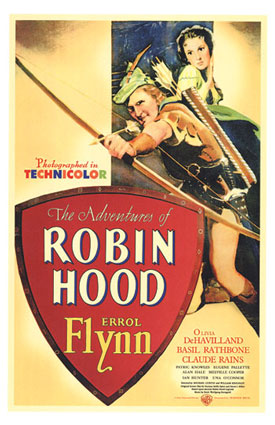

Olivia de Havilland was born on July 1st 1916 in Tokyo, Japan. Born to a British patent attorney and his wife. Her sister, later known as Joan Fontaine, was born the following year.
When Olivia was three her parents divorced and she moved with her remaining family to Los Angeles, California. Olivia caught the acting bug while in high school. After she graduated she enrolled in Mills College in Oakland where she appeared in the play, A Midsummer Night's Dream. That is where she caught the eye of Max Reinhardt. He put her in his stage version of the play and in 1935, she appeared in the film version. She signed a contract to Warner Bros. and her next film was Captain Blood in which she starred with Errol Flynn. This was the first of what would be eight films the two stars would be paired in. She made several more films for Warner Bros in the 1930s, but was loaned out to David O. Selznick for the 1939 masterpiece Gone With The Wind. While every actress in the free world auditioned for Scarlett, Olivia wanted to play Melanie Hamilton. She felt more connected to Melanie then to Scarlett. After much persuasion, WB loaned her out. She had to audition in secret because it went against her contract. I'm glad she did, because I couldn't see anyone else playing that part. She also received her first Academy Award nomination.
Olivia then went back to Warners. In 1941 she starred in the film Hold Back the Dawn. She was again nominated for an Academy Award, but lost to her sister, Joan Fontaine for the movie Rebecca. The two sisters didn't get along as it was, and this only made the feud worse. After the fall, Olivia demanded to get better roles instead of the sweet gals she was use to playing. WB suspended her for six months because of the fact that actors weren't allow to do as they wanted. When Olivia's contract with WB was up in 1942, WB told her she had to make up her six months of lost time. She refused and sued the studio. The courts ruled in her favor, but even better they ruled that all actors were limited to a seven year contract that did not include suspension. Known as the "De Havilland Law" this meant that studios had to treat their actors with respect.
During the whole proceedings Olivia didn't appear in a single film. She returned to films in 1946 for the film To Each His Own. Olivia was again nominated for an Academy Award, but this time she won. In 1948 she appeared in the film The Snake Pit. It was the first film to tackle mental illness and show the true hardings of it, at least as much as they could. In 1949 she only made one film The Heiress, but won another Academy Award for her performance in it. Olivia then took a three year hiatus and popped back up again in the film My Cousin Rachel in 1952.
In the next few decades Olivia made less and less films. She often appeared on Broadway or in TV films. For now, her last film was the TV movie The Woman He Loved in 1988.
Olivia has been married and divorced twice. She has two children, one from each of her marriages. She is currently writing an autobiography, so be on the look-out for that. Next year she will turn 90 years young!

1939 (12th) ACTRESS IN A SUPPORTING ROLE -- Gone with the Wind {"Melanie Hamilton"}
1941 (14th) ACTRESS -- Hold Back the Dawn {"Emmy Brown"}
1946 (19th) * ACTRESS -- To Each His Own {"Jody Norris"}
1948 (21st) ACTRESS -- The Snake Pit 1949 (22nd) * ACTRESS -- The Heiress {"Catherine Sloper"}



